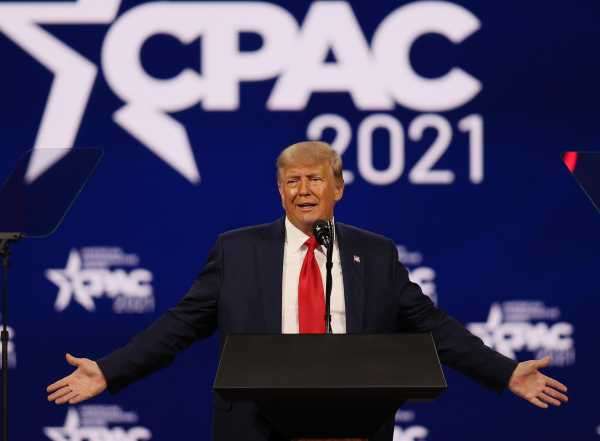
Former President Donald Trump has long been a source of misinformation on the Covid-19 pandemic. But on Wednesday, he did something possibly, well, helpful: He told his supporters that the Covid-19 vaccines work.
“I would recommend it,” Trump said on Fox News. “And I would recommend it to a lot of people that don’t want to get it and a lot of those people voted for me, frankly. … It is a safe vaccine and it is something that works.”
He stopped a little short of outright telling his supporters to get the shots. “We have our freedoms,” he hedged, alluding to the fact that people can choose not to get the vaccines.
But you know what? This is a step in a good direction.
Arguably, telling people that the vaccines are safe and encouraging his supporters to get them is the most helpful way Trump can wield influence at this point in the pandemic.
It could help save lives and avert hospitalizations, particularly among Republicans, who are currently among the most hesitant group to get vaccinated.
A recent NPR/PBS NewsHour/Marist Poll found that 49 percent of Republican men say they do not plan on getting vaccinated if eligible. This is the highest level of hesitancy across any of the subgroups polled. Thirty-four percent of Republican women also say they would not get vaccinated. (A total of 47 percent of Trump’s 2020 supporters said they would refuse.)
“I’m very surprised at the high percentage of Republicans who say they don’t want to get vaccinated,” Dr. Anthony Fauci, director of the National Institute of Allergy and Infectious Diseases, said on Fox News Sunday, adding “it would be very helpful” if Trump told his supporters to get vaccinated.
In comparison, just 6 percent of Democratic men and 14 percent of Democratic women say they would refuse. Nationally, 30 percent of the respondents said they would refuse a vaccine. And overall, vaccine hesitancy is dropping across the country.
Republicans are starting to look like the outliers here, and Trump would do well to change their minds.
Trump has immense powers to change the minds of his supporters
Trump owns a lot of the blame for much of the Covid-19 vaccine hesitancy among Republicans for many reasons. For instance, his constant attacks on scientists and his insinuations that the career officials at the Food and Drug Administration played politics with the vaccine approval. His overall dismissal of the severity of the pandemic has divided Americans’ responses along partisan lines.
But he could still do some good. In the past, he’s shown he has immense powers to sway public opinion among of his supporters — nearly overnight at times.
My colleague, Dylan Matthews, has documented his sudden change in opinion on topics like Russia and Vladimir Putin, free trade, and support of the news media’s watchdog role. Or, consider how Trump riled up Republicans’ hostility toward the NFL after calling on the league to fire players who kneeled in protest during the national anthem.
Trump’s power to sway Republican minds has also been shown experimentally, as I wrote about in a 2018 article on the “follow the leader” effect in political science.
In January 2017, Brigham Young University political scientists Michael Barber and Jeremy Pope designed an experiment that asked: Are Trump’s supporters ideological, or will they follow him wherever his policy whims go? Right after Trump’s inauguration, they ran an online experiment with 1,300 Republicans.
The study was pretty simple. Participants were asked to rate whether they supported or opposed policies like a higher minimum wage, the Iran nuclear deal, restrictions on abortion access, background checks for gun owners, and so on. These are the issues Republicans and Democrats tend to be sharply divided on.
Barber and Pope wondered: Would Republicans be more likely to endorse a liberal policy if they were told Trump supported it?
The answer: “On average, across all of the questions that we asked, when presented with a liberal policy, Republicans became about 15 percentage points more likely to support that liberal policy” when they were told Trump supported it, Pope says. In other words, they follow their leader. “The conclusion we should draw is that the public, the average Republican sitting out there in America, is not going to stop Trump from doing whatever he wants.”
Last year, I contacted Barber and Pope and asked them if they think Trump has the power to influence GOP hesitaters to take the vaccine. “Trump’s best move from a public health perspective would be to take credit for whatever vaccine emerges — moving Republican voters to be more trusting of the vaccine,” Barber said in an email.
The coronavirus doesn’t care about someone’s political affiliation. It will infect Democrats, Republicans, independents, anarchists, you name it. The more people who get vaccinated, the more likely we’ll emerge from the pandemic sooner rather than later.
Millions turn to Vox to understand what’s happening in the news. Our mission has never been more vital than it is in this moment: to empower through understanding. Financial contributions from our readers are a critical part of supporting our resource-intensive work and help us keep our journalism free for all. Help us keep our work free for all by making a financial contribution from as little as $3.
Sourse: vox.com






